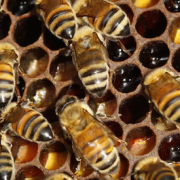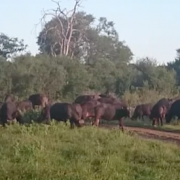Baboons, the gangsters of the bush
I love baboons, but most locals here would disagree with this sentiment. Baboons are so ubiquitous that they are met with a sense of resentment, not least because they roam the streets of towns and villages, raiding every house and building that has left its doors or windows open. A baboon troop visiting your home or kitchen would certainly not be an event that causes warm feelings to bubble up within you for this species, as they will thank you for your unintended hospitality by absolutely thrashing your place.
But I have no house here and watching them in the wild is always a guaranteed moment of entertainment. People get excited about the big cats, but all I have seen them do is lie flat on their bellies – the baboons however are jumping around, playing, arguing, posing, barking, pretending and everything else that you would expect from a bunch of monkeys.
And for a sound recordist, they are delightfully vocal. I had set up my mics for a few nights underneath and nearby a group of ana trees, favourited by the baboons to roost in at night for the shape of their branches. Their defensive strategy at night consists of the small and young ones to stay on the far sides of the tree branches, the bigger ones more central. If their arch enemy the leopard decides to climb up the tree to try and have a snack, it will first have to pass the big boys guarding the centre. Baboons have vicious canines the size of a lion’s, and have been known to kill a leopard in a mobbing attack.
The hyena is no natural predator of the baboon for it climbs no trees, but the above recording could be interpreted as the baboons taking a respectful silence as soon as the lonely hyena to the left of the channel starts whooping in search for its family members.
That very same night held another event that caused the roosting baboons some stress, as a big apple leaf tree right next to them spontaneously had one of its stems crash down to the ground.
The social structure of the baboon is known as an oligarchy, a word we in the West usually associate with Russian magnates and oil barons. In the context of baboons, what it means is that a troop is lead by a dominant, aggressive male, who is supported by a small group of less dominant but also aggressive henchmen: a bunch of gangsters supporting their gang leader essentially, harrowing everyone else in the troop. So next time you see the rudeboys in their hoodies on the streets, just think of baboons and have a little chuckle.
Be that as it may, baboons appear to be easily upset and bark the alarm for the slightest thing, based on how regularly we can hear them go off on one of their hissy fits. The above sound recording demonstrates one of those domestic arguments, where something set off the one group roosting in a tree to the left, only for the others, including the ones in the tree under which the mic was positioned, eventually all chipping in and having their say.
And finally, here is a curious recording that took me some time and help from people far more expert than me to figure out what I was listening to. My first thoughts were that it might be some kind of bird having a weird call, but as it turns out it is actually a young baboon having the hiccups. While we don’t know why it was feeling this way, we could wager some guesses. The first would be that it is ill, of course. Another option is that it ate the seeds of a red bushwillow, a very popular tree browsed by many animals, but its seeds are avoided as they apparently can cause the hiccups. Perhaps this young baboon hadn’t learned this lesson yet. And the final, more entertaining but less likely option I can think of is that perhaps this particular one managed to steal a bottle of alcohol during that morning’s raid of the nearby lodge, and took a few sips too many before presumably discarding it.












This is a fantastic post, thank you for sharing!